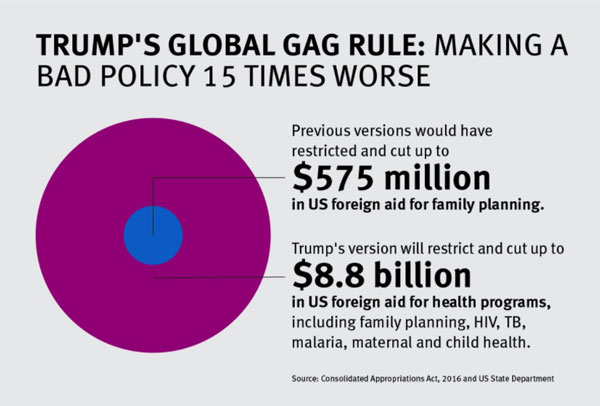
HRW says Kenya and Uganda both rely heavily on US health funds to combat high maternal mortality rates and the HIV/AIDS epidemic.
In Kenya, maternal deaths account for 14 percent of deaths of women ages 15 to 49, and it is among the six countries with the highest total number of HIV infections in the world.
US global health funds pay for anti-retroviral treatment for 890,000 Ugandans with HIV, about 93 percent of the people receiving HIV treatment in the country. The Ugandan government has estimated that unsafe abortions contribute to 8 percent of maternal deaths.
Human Rights Watch found the policy has triggered reductions in key sexual and reproductive health services from well-established organizations that cannot easily be replaced. For example, Family Health Options Kenya (FHOK) runs 16 healthcare facilities in the country. FHOK representatives told us the organization will not comply with the restrictions and therefore will lose US funds, which make up roughly 60 percent of its budget, and that it may have to cut as many as half of its services. The organization has already closed one clinic and canceled 100 planned outreach events, including for cervical cancer screening, HIV testing, and family planning counseling, that typically reach 100 people each time.
“Many of the groups that now stand to lose their funding have long and strong track records and are among the best placed and qualified to do the work,” Wheeler said. “In many cases, alternatives with comparable infrastructure, expertise, and community relationships simply do not exist.”
Although governments receiving US funds are exempt from the policy, Human Rights Watch found that in Kenya and Uganda, many government health clinics will be indirectly weakened. Many depend on nongovernmental groups for training and equipment to provide safe abortion care, including in cases of rape or incest, or to save a woman’s life. Groups interviewed said they doubt these government clinics will have the capacity to continue providing comprehensive safe abortion care without their support.
Many of the healthcare providers said they feared an increase in unsafe abortions and associated maternal deaths as a result of the cuts in services, reductions in referrals, reduced capacity of government clinics, and uncertainty about whether needed materials and equipment will be available.
As the US government embarks upon a six-month review of the policy’s impacts, Human Rights Watch said that six months is not long enough to sufficiently assess this. Many organizations have not yet signed new grants or renewals and have not yet had to cut or shift their programs. This is the case for many groups receiving PEPFAR funds to prevent and treat HIV, a large proportion of US global health funds. Interviews with sex worker organizations that have come up for funding renewal illustrated that they had to make cruel programmatic choices, including choosing between funds for lifesaving antiretroviral therapy for their members or lifesaving reproductive health services.
“These donor-imposed restrictions undermine hard-won relationships of trust developed with a key population on the front lines of efforts to fight HIV,” Wheeler said
The majority of people interviewed said they had not received any direct communications or explanations of the policy from US government grant administrators. In a letter to Human Rights Watch, USAID said that it has trained its staff, published the policy on its website, and created an online course.
However, organizations interviewed had many questions about the scope and implementation of the policy; and about access to US government-funded equipment and supplies. They also had questions about whether groups that comply with the policy could partner and meet with groups that do not. In the absence of more detailed guidance, some organizations appeared to have interpreted the policy’s restrictions too broadly – for example, feeling they should avoid community outreach on the risks of unsafe abortion.
“President Trump should rescind this devastating policy, which will set back hard-won global health gains,” Wheeler said.
 The Independent Uganda: You get the Truth we Pay the Price
The Independent Uganda: You get the Truth we Pay the Price


